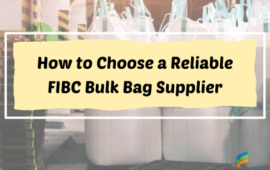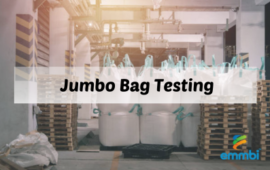In the storage and transport of food grains, one of the most important elements is packaging. Commercial agriculture has been around for a long time, and different packaging material has been used over the centuries, each being the best in is era. While cloth bag and burlap bags were the preferred choice in the earlier decades, polypropylene bulk bags are the best packaging option available today for packing food grains. Following are five reasons that make polypropylene bags suitable for food grains packaging more than other conventional options:
1. Strong & Lightweight
One of the biggest challenges in food grains transport is to have strong containers that are lightweight, which makes polypropylene FIBC bags are a great option. Unlike burlap bags or cloth bags, FIBC bulk bags are made of top-quality polypropylene, an ultra-lightweight and strong material. Burlap and cloth bags cannot hold as much as an FIBC bulk bags or woven bags can, which can be up to 2500kgs. Their considerably lightweight and superior strength makes them apt for large scale food grains transport.
2. Durability
Polypropylene is strong material, and its bags are no different. They are highly resistant to UV and chemical reactions. They can also endure extreme climatic conditions – hot and cold, much better than the conventional options, keeping the food grains palatable and safe for a longer duration. Polypropylene bags have other additional durability benefits that cloth and gunny bags lack, like resistance to biodegradation.
3. Economical
FIBC bulk bags made from polypropylene are highly economical, and are a potent affordable alternative to conventional packaging material. Polypropylene is a form of reusable plastic, which is priced lesser than cloth and gunny bags, with a simple and robust construction. This helps the suppliers reduced the overall cost of food grains, getting an edge over competition. They are also easily accessible, which further minimizes procuring costs. For instance, Emmbi produces over a hundred thousand plastic woven sacks per day of different construction and designs, making them economical for multiple businesses.
4. Custom Printing
Like all other industries, marketing is important for the food grains industry as well. The custom printing option available with FIBC bulk bags made by Emmbi has a number of marketing benefits like branding and brand image creation. Custom printing on a bulk bag looks much more appealing than that on a gunny bag or a cloth bag, increasing the brand value and compelling the viewers to choose them over the grains stored in other type of containers. Emmbi offers printing on small woven sacks, which can come in handy for a storing and transporting food grains in small quantities.
5. Variety of Sizes
Depending on the products, bulk bags come in a number of sizes. A one tonne polypropylene FIBC bulk bag will help you store huge quantities of food grains in one single container, optimizing available space and controlling costs. Having large sizes of bulk bags helps store food grains for a long time, and also in transporting them. You would need 20 bags with the capacity of 50kgs to carry 1000 kilos, while a single 1 ton bag can do the job for you.
6. Recyclability
Single polymer polypropylene bulk bags are appropriate for recycle, reducing the ecological impact of plastic production. Recycling these bags will not only help keep the environment clean and green, but will also significantly reduce the cost of packaging as these bags can be reused with SF 6:1.



